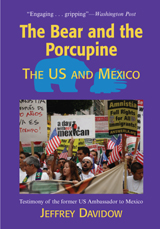|
|
The Bear and the Porcupine: The US and MexicoDavidow, Jeffrey
 Jeffrey Davidow coined the phrase “the bear and the porcupine”—which has now entered Mexican political discourse—to describe the difficult relationship between the hypersensitive Mexican “porcupine” and the “insensitive” American bear. Jeffrey Davidow coined the phrase “the bear and the porcupine”—which has now entered Mexican political discourse—to describe the difficult relationship between the hypersensitive Mexican “porcupine” and the “insensitive” American bear.
In this revised and expanded second edition, Davidow picks up the story of U.S.-Mexican relations since he left his ambassadorial post in 2003, explaining the implications of the Fox administration and the outcome of the 2006 election and reflecting on the volatile immigration issue that has exploded into public debate in the United States.
Jeffrey Davidow assumed the presidency of the Institute of the Americas on June 1, 2003. After serving thirty-four years in the State Department, he retired as America’s highest-ranking diplomat, one of only three people to hold the personal rank of Career Ambassador. During his Foreign Service career, Ambassador Davidow focused much of his efforts on improving relations with Latin America. He served in increasingly senior positions in the U.S. embassies in Guatemala, Chile, and Venezuela, and then later returned to Venezuela as ambassador from 1993 to 1996. From 1996 to 1998, he was the State Department’s chief policy maker for the hemisphere, serving in the position of Assistant Secretary of State. He then served as ambassador to Mexico from 1998 to 2002. Initially appointed to that position by President Clinton, he was asked by President Bush to remain in his post for an additional eighteen months. Early in his Foreign Service career, he served as a congressional staff aide in a program organized by the American Political Science Association. In that capacity, he organized in 1979 the first congressional hearings on the possibility of establishing a free trade area for North America.
|
 Jeffrey Davidow coined the phrase “the bear and the porcupine”—which has now entered Mexican political discourse—to describe the difficult relationship between the hypersensitive Mexican “porcupine” and the “insensitive” American bear.
Jeffrey Davidow coined the phrase “the bear and the porcupine”—which has now entered Mexican political discourse—to describe the difficult relationship between the hypersensitive Mexican “porcupine” and the “insensitive” American bear.